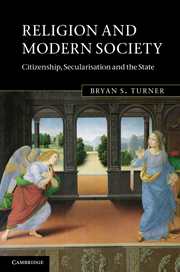Book contents
- Frontmatter
- Contents
- Acknowledgements
- Introduction: the state of the sociology of religion
- Part I Theoretical frameworks: the problem of religion in sociology
- Part II Religion, state and post-secularity
- 7 The secularisation thesis
- 8 Legal pluralism, religion and multiculturalism
- 9 Managing religions: liberal and authoritarian states
- 10 Religious speech: on ineffable communication
- 11 Spiritualities: the media, feminism and consumerism
- 12 Religion, globalisation and cosmopolitanism
- 13 Civil religion, citizenship and the business cycle
- 14 The globalisation of piety
- References
- Index
7 - The secularisation thesis
Published online by Cambridge University Press: 05 June 2012
- Frontmatter
- Contents
- Acknowledgements
- Introduction: the state of the sociology of religion
- Part I Theoretical frameworks: the problem of religion in sociology
- Part II Religion, state and post-secularity
- 7 The secularisation thesis
- 8 Legal pluralism, religion and multiculturalism
- 9 Managing religions: liberal and authoritarian states
- 10 Religious speech: on ineffable communication
- 11 Spiritualities: the media, feminism and consumerism
- 12 Religion, globalisation and cosmopolitanism
- 13 Civil religion, citizenship and the business cycle
- 14 The globalisation of piety
- References
- Index
Summary
Introduction: the secular in historical and comparative perspective
There are many social and political reasons that may explain why the topic of secularisation has become a major issue in the humanities and social sciences and why it has also become such a critical problem of modern political life. One obvious reason is that in the modern world many important social movements find their inspiration in religious ideas and they are often directed by religious leaders. It is, of course, often difficult to separate out the nationalist, ethnic and political dimensions of what we call ‘religious movements’ that are the carriers of social protest, and hence one has to be cautious about attributing religious causes to political phenomena or religious motives to their adherents. One example would be the plight of the Hui in Yunnan and Uighurs in Xinjiang in modern-day China (Berlie, 2004) or the enforced use of Islam in Chechnya to define a form of ethno-nationalism that is still acceptable to the state in Putin's Russia. In any discussion of secularisation, we have to keep in mind that much of the debate has been generated not just by the growth of radical forms of Islam, but more generally by the rise of fundamentalism (Marty and Appleby, 1991). What has been identified as a crisis of liberalism around the separation of the church and state is nevertheless closely connected with the Western response to the growing influence of Islam in Europe.
- Type
- Chapter
- Information
- Religion and Modern SocietyCitizenship, Secularisation and the State, pp. 127 - 150Publisher: Cambridge University PressPrint publication year: 2011



